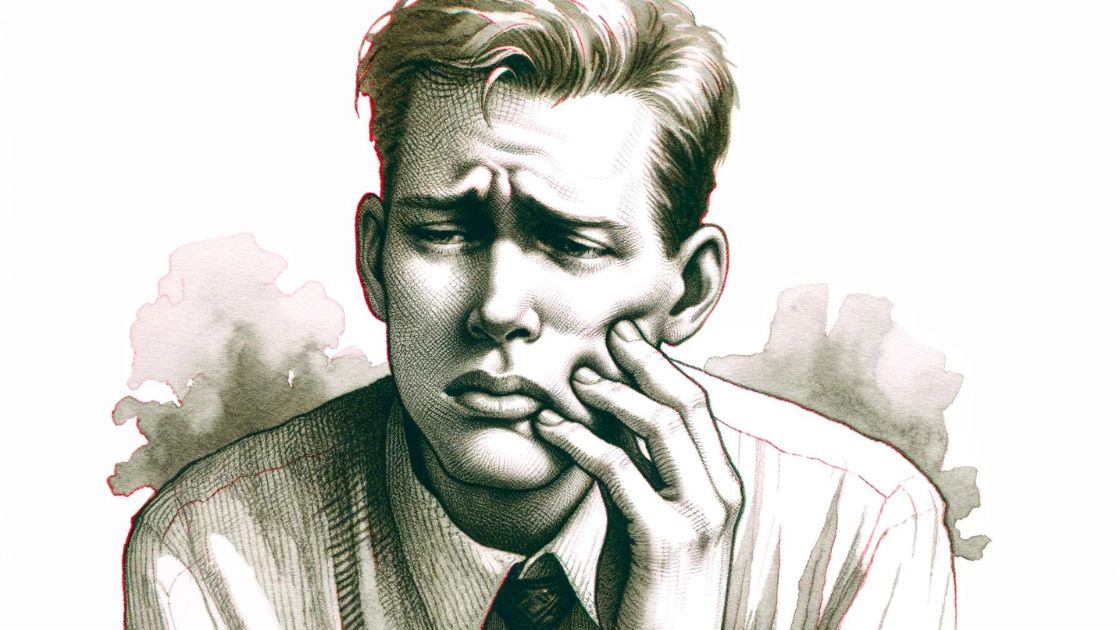Key takeaways:
~ Teeth clenching or grinding, called bruxism, can cause damage to your teeth.
~ Bruxism has a genetic component to it, for many people.
~ Understanding where your susceptibility lies may help you target the right solution for your teeth.
Bruxism, genes, and serotonin:
Bruxism is a condition where you unconsciously clench or grind your teeth. This can occur when sleeping (sleep bruxism) or while you are awake.
Bruxism can cause wear on the enamel of the teeth and even cause teeth to crack. Additionally, people with bruxism may have jaw pain, headaches, migraines, or sleep disorders.[ref]
Physical causes of bruxism, like crooked or missing teeth, can be addressed by your dentist.
But why do some people have the innate urge to clench their teeth to the point of pain or shearing down the enamel?
Genomics studies point to the serotonin system as one strong cause. People with genetic variants in a serotonin receptor are at an increased risk for bruxism.[ref]
What does serotonin do?
Serotonin is a neurotransmitter found in the brain as well as the gut. Serotonin is important for mood, memory, and cognition in the brain.
Anxiety has long been linked to teeth grinding, and research shows that people with anxiety are more likely to have bruxism.[ref]
Coming back to genetics…
Both serotonin receptors and dopamine receptor variants have been linked to an increased risk for bruxism. Variants in these genes also increase the risk of anxiety and neuroticism. Research shows that people with bruxism are much more likely to have relatives, indicating a genetic component to it.[ref]
Bruxism Genotype Report:
Members: Log in to see your data below.
Not a member? Join here.
Why is this section is now only for members? Here’s why…
Lifehacks:
Now that you know that the serotonergic system is involved in bruxism, how can you use this information? Here are some suggestions:
If you grind your teeth and have these variants, you may want to learn more about your serotonin genes.
Related Articles and Topics:
Problems sleeping? Your genes could hold the solutions
Your genes could play a role in why you aren’t sleeping well. Genes interact with your life – such as stress, caffeine, light coming through your window at night. Exploring your genes related to sleep disorders may help you fix your sleep problems.
Top 10 Genes to Check in Your Genetic Raw Data
These are 10 genes with important variants that can have a big impact on health. So check them out, cross them off your list if you don’t have them — and read the articles to learn more if you do carry the variant.
Tryptophan: Building block for serotonin and melatonin
Tryptophan metabolism influences mood, sleep, neurotransmitters, and immune response.
Circadian Rhythms: Genes at the Core of Our Internal Clocks
Circadian rhythms are the natural biological rhythms that shape our biology. Most people know about the master clock in our brain that keeps us on a wake-sleep cycle over 24 hours. This is driven by our master ‘clock’ genes.
References:
Abe, Yuka, et al. “Association of Genetic, Psychological and Behavioral Factors with Sleep Bruxism in a Japanese Population.” Journal of Sleep Research, vol. 21, no. 3, June 2012, pp. 289–96. PubMed, https://doi.org/10.1111/j.1365-2869.2011.00961.x.
Alban, Patrick and DC. “Serotonin Supplements to Boost Mood Naturally (Detailed Guide).” Be Brain Fit, https://bebrainfit.com/serotonin-supplements/. Accessed 29 July 2022.
Alonso-Navarro, Hortensia, et al. “Bruxism Possibly Induced by Venlafaxine.” Clinical Neuropharmacology, vol. 32, no. 2, Apr. 2009, pp. 111–12. PubMed, https://doi.org/10.1097/WNF.0b013e31816a3519.
Alves, Anne C., et al. “Bruxism. Masticatory Implications and Anxiety.” Acta Odontologica Latinoamericana: AOL, vol. 26, no. 1, 2013, pp. 15–22.
Amorim, Cinthia S. M., et al. “Effect of Physical Therapy in Bruxism Treatment: A Systematic Review.” Journal of Manipulative and Physiological Therapeutics, vol. 41, no. 5, June 2018, pp. 389–404. PubMed, https://doi.org/10.1016/j.jmpt.2017.10.014.
Beers, E., and A. C. van Grootheest. “[Bruxism as a side effect of serotonin re-uptake inhibitors].” Nederlands Tijdschrift Voor Tandheelkunde, vol. 114, no. 9, Sept. 2007, pp. 388–90.
Garrett, Andrew R., and Jason S. Hawley. “SSRI-Associated Bruxism.” Neurology: Clinical Practice, vol. 8, no. 2, Apr. 2018, pp. 135–41. PubMed Central, https://doi.org/10.1212/CPJ.0000000000000433.
Rajan, Royce, and Ye-Ming Sun. “Reevaluating Antidepressant Selection in Patients With Bruxism and Temporomandibular Joint Disorder.” Journal of Psychiatric Practice, vol. 23, no. 3, May 2017, pp. 173–79. PubMed, https://doi.org/10.1097/PRA.0000000000000227.
Wieckiewicz, Mieszko, et al. “Genetic Basis of Sleep Bruxism and Sleep Apnea—Response to a Medical Puzzle.” Scientific Reports, vol. 10, May 2020, p. 7497. PubMed Central, https://doi.org/10.1038/s41598-020-64615-y.
Young, Simon N. “How to Increase Serotonin in the Human Brain without Drugs.” Journal of Psychiatry & Neuroscience : JPN, vol. 32, no. 6, Nov. 2007, pp. 394–99. PubMed Central, https://www.ncbi.nlm.nih.gov/pmc/articles/PMC2077351/.

